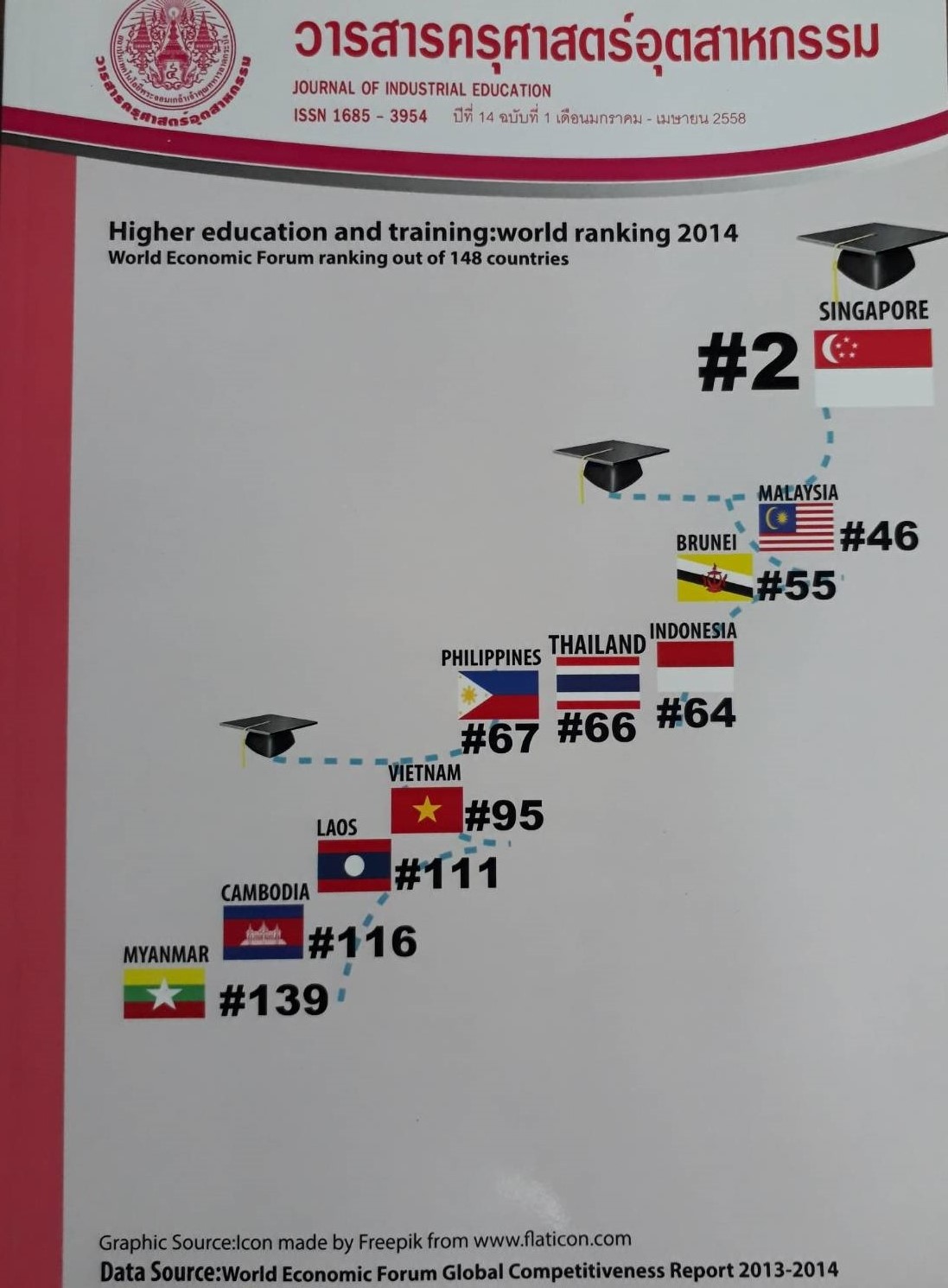The Development of Research-Based Learning Model to Develop Desirable Competency of Students for Higher Vocational Education in Institution of Vocational Education in Agriculture
Keywords:
Learning Management Model, Research-Based Learning, Desirable Competences, Vocational EducationAbstract
Research-based learning activities are important for students’ cognitive creation. Therefore, the study of research-based learning model for improving students’ desirable competences is very useful. The purposes of this research were 1) to study the research-based learning management status of Vocational Education in Agricultural Institutions and 2) to develop of research-based learning model and to study the model’s appropriateness for improving students’ desirable competences in Higher Vocational Education. The research designs were quantitative and qualitative designs that consisted of 2 stages. The first stage was done for the first purpose. Simple random sampling was employed to obtain samples for the survey which consisted of 12 colleges: 120 teachers and 120 students in Higher Vocational Education and interviews which included 4 colleges: 10 students in each college. The instruments were questionnaires written by the authors. The range of IOC was from 0.60 to 1.00. The reliability was 0.9413 and 0.9690 for teachers’ and students’ questionnaires, respectively. The semi-structural questionnaires written by the authors were used for student interviews. The range of IOC was from 0.80 to 1.00. The second step was done for the second purpose. The instruments were research-based learning management model and a questionnaire written by the authors. The range of IOC for the questionnaire was from 0.60 to 1.00. The reliability was 0.9514. It was indicated by 16 experts. The descriptive statistics used was percentage, mean, standard deviation. Content analysis was used for qualitative data.
The research findings were as follows: 1) the research-based learning management status of Vocational Education in Agricultural Institutions was quite low. In the preparation stage, there were learning management following research process, simulation for problem solving, and student participation in learning to plan. In the learning stage, there were measurement and evaluation orientation, continuous learning encouragement and feedback after evaluation. In the conclusion stage, there were learning sharing, summarizing and knowledge reflection and more inquiry encouragement. 2) Research-based learning management model for improving students’ desirable competences of Vocational Education in Agriculture was composed of 7 elements. They were research-based learning, research knowledge, analytical thinking, problem solving, information technology, communication and authentic assessment. They comprised of 7 steps: 1) research preparation 2) research-based learning stimulation 3) planning and participatory evaluation 4) learning by research 5) knowledge summary and reflection 6) presentation and sharing and 7) learning evaluation. This model had the appropriateness at high level by the experts’ assessment. Therefore, both students and teachers have to gain their knowledge and comprehension in research in order to integrate with their instruction and learning activities for met cognition.
References
[2] สำนักงานเลขาธิการสภาการศึกษา. 2555. การศึกษาวิจัยความต้องการกำลังคนเพื่อวางแผนผลิตและพัฒนากำลังคนของประเทศ. กรุงเทพฯ: สำนักงานเลขาธิการสภาการศึกษา.
[3] อกนิษฐ์ คลังแสง. 2553. พลิกโฉมคุณภาพอาชีวศึกษาไทยด้วยภาคีเครือข่ายเข้มแข็ง.[ออนไลน์]. เข้าถึงได้จาก:https://news.thaischool.in.th (วันที่ค้นข้อมูล: 9 พฤศจิกายน 2555).
[4] Green, R. 2012. Attitudes and Perceptions of Vocational Education in New York City: Implications for the Mayor’s School Reform Initiative. Doctor of Education, North Central University.
[5] Papert, S. 2006. Constructionism. [online]. Retrieved from https://https://sites.google.com (October 30, 2012).
[6] Dempster, J. 2003. Developing and supporting research-based learning and teaching through technology. Usability Evaluation of Online Learning Programs, United Kingdom: Idea Group Inc.
[7] Healey, M. and Jenkins, A. 2009. Developing undergraduate research and inquiry. In The Higher Education Academic. Heslington: Innovation Way York Science Park.
[8] Griffiths, R. 2004. Knowledge production and the research-teaching nexus: the case of the built environment disciplines. Journal of Studies in Higher Education. 9(6), p. 709-726.
[9] Healey, M. 2005. “Research Based Learning and Teaching,” Journal of Geography in Higher Education, 9, p.183-201.
[10] ทิศนา แขมมณี. 2553. ศาสตร์การสอน : องค์ความรู้เพื่อการจัดกระบวนการเรียนรู้ที่มีประสิทธิภาพ. พิมพ์ครั้งที่ 12. กรุงเทพฯ: สำนักพิมพ์แห่งจุฬาลงกรณ์มหาวิทยาลัย.
[11] “พระราชบัญญัติการอาชีวศึกษา พ.ศ. 2551,”2551. ราชกิจจานุเบกษา. เล่มที่ 125 ตอนที่ 43 ก.หน้า 3. 5 มีนาคม 2551.
[12] McKinney, K. 2009. Active Learning. [online]. Retrieved from https://www.cat.ilstu.edu/additional/tips/newActive.php (June 30, 2010).
[13] Donald Clark. 2003. Instructional System Design-Analysis Phase. [online]. Retrieved from https://www.nwlink.com/donclark/hrd (June 21, 2011).
[14] บุญเลี้ยง ทุมทอง. 2556. ทฤษฎีและการพัฒนารูปแบบ การจัดการเรียนรู้ (Theories and Development of Instructional Model). กรุงเทพฯ: โรงพิมพ์เอส พริ้นติ้งไทยแฟคตอรี่.
[15] นฤมล รอดเนียม. 2554. การพัฒนารูปแบบการเรียนรู้ แบบผสมผสานโดยใช้การวิจัยเป็นฐานเพื่อพัฒนาจิตวิทยาศาสตร์สำหรับนิสิตปริญญาตรี. วิทยานิพนธ์การศึกษาดุษฎีบัณฑิต สาขาเทคโนโลยีและสื่อสารการศึกษา บัณฑิตวิทยาลัย มหาวิทยาลัยนเรศวร.
[16] Brew, A. and Jewell, Evan. 2012. Enhancing Quality Learning through Experiences of Research-Based Learning: Implication for Academic Development. International Journal for Academic Development, 17(1) P. 47-58.
Downloads
Published
How to Cite
Issue
Section
License
"The opinions and contents including the words in papers are responsibility by the authors."
"ข้อคิดเห็น เนื้อหา รวมทั้งการใช้ภาษาในบทความถือเป็นความรับผิดชอบของผู้เขียน"



